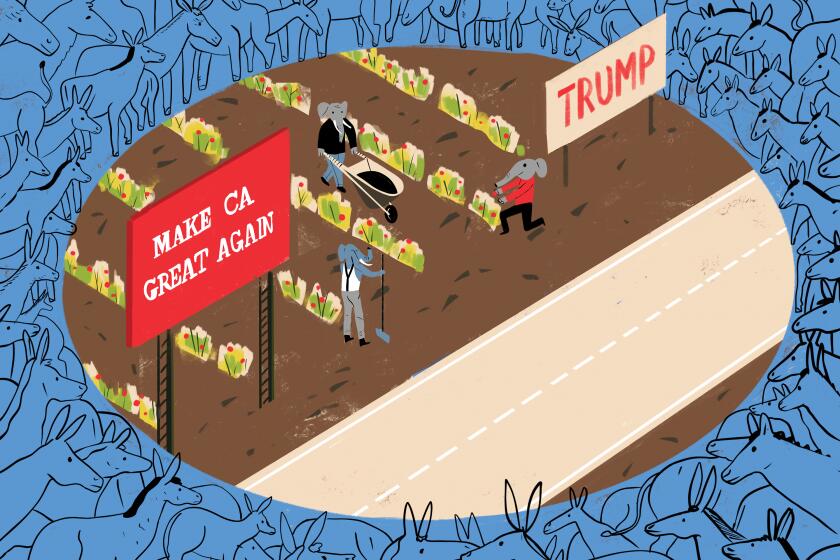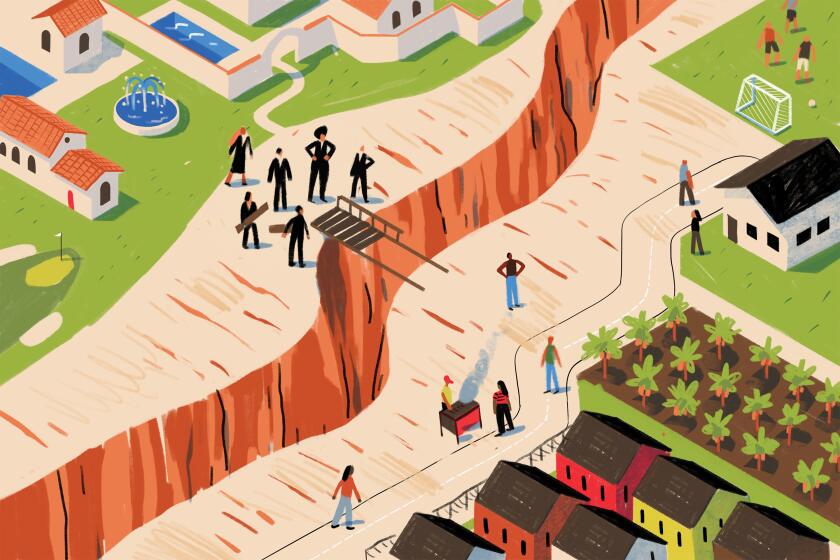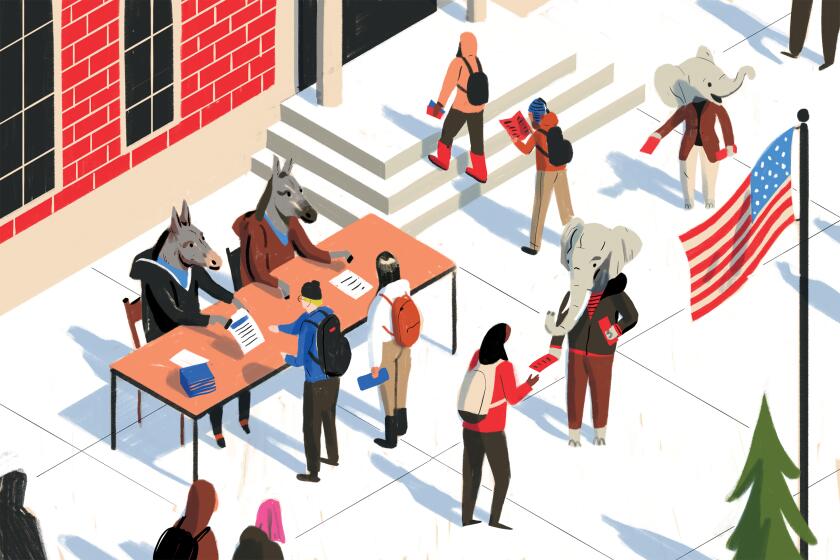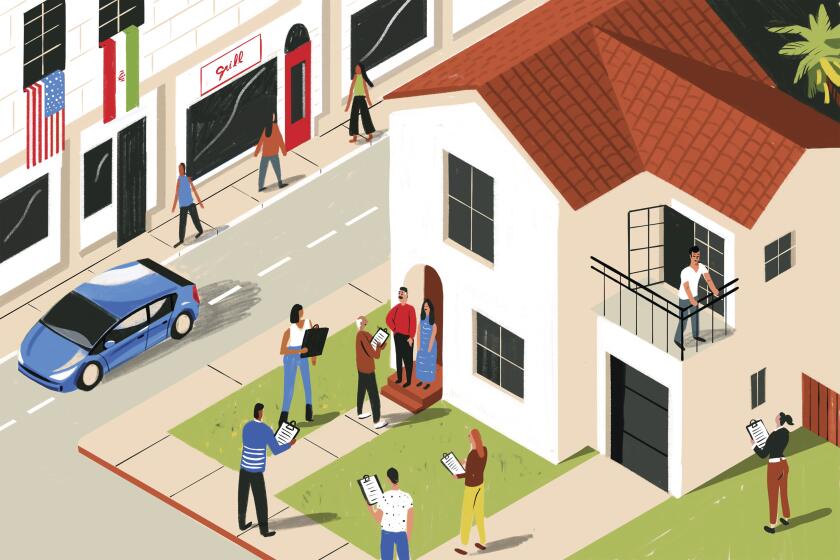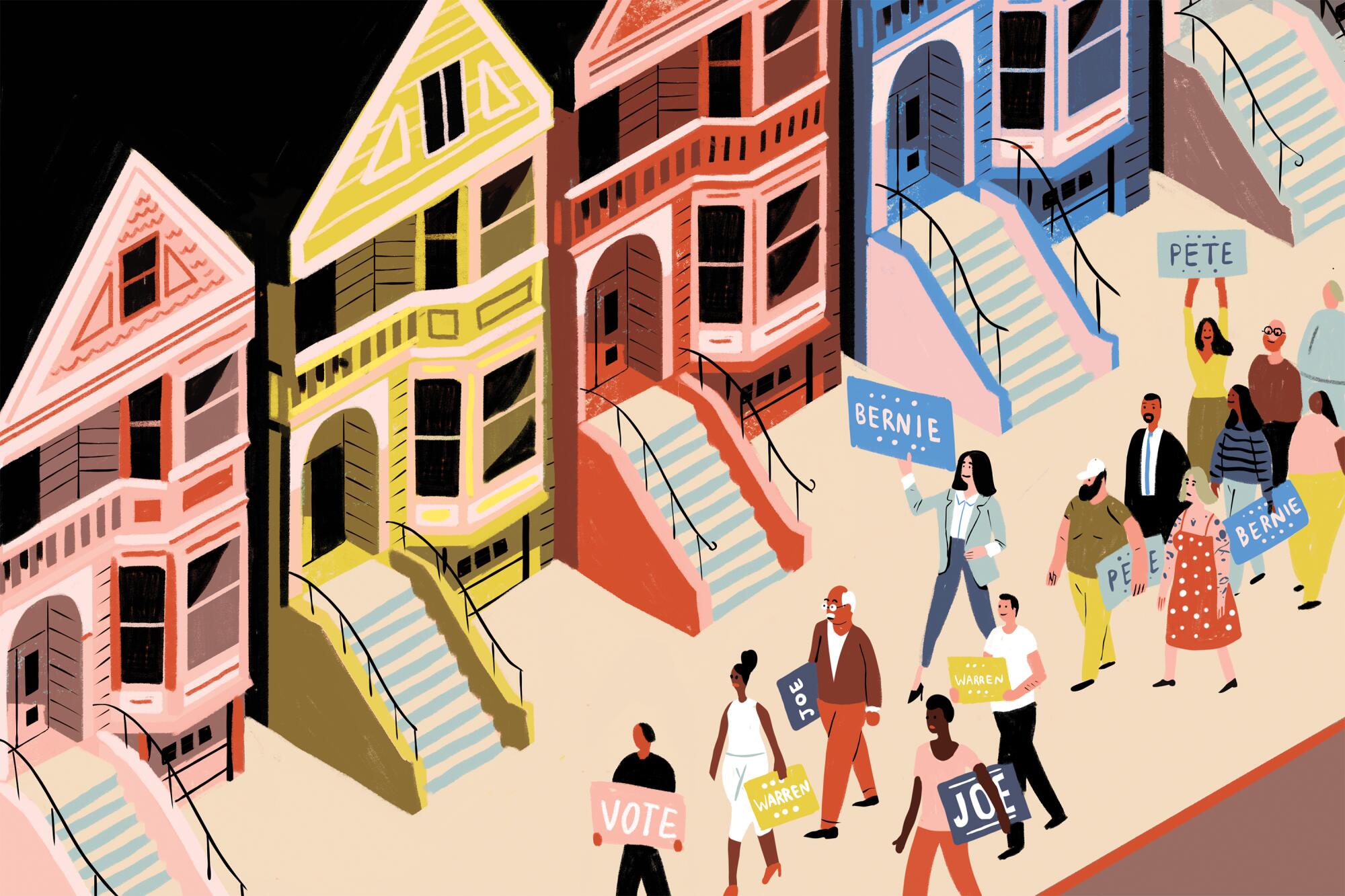
SAN FRANCISCO — The volunteers in the shuttered restaurant hung with Elizabeth Warren signs barely noticed the Nude Valentine’s Love Parade as it passed by — nine chilly souls with a police escort on a Saturday in the Castro District.
The California primary was 17 days away. The women and men at Cafe Flore were preparing to stump for the Massachusetts senator. Their focus was on weightier matters than the “body freedom” marchers — like what to say when voters asked why Warren had lost momentum in the race to be the Democratic presidential nominee.
Assemblyman David Chiu (D-San Francisco), who gets a nearly perfect score in the Progressive Voters Guide, was on hand to fire up the Warren troops. “Whether you care about what she has envisioned for immigrants, for our LGBT community,” he said, “I think most of us in San Francisco, we love the fact that she shares our progressive values.”
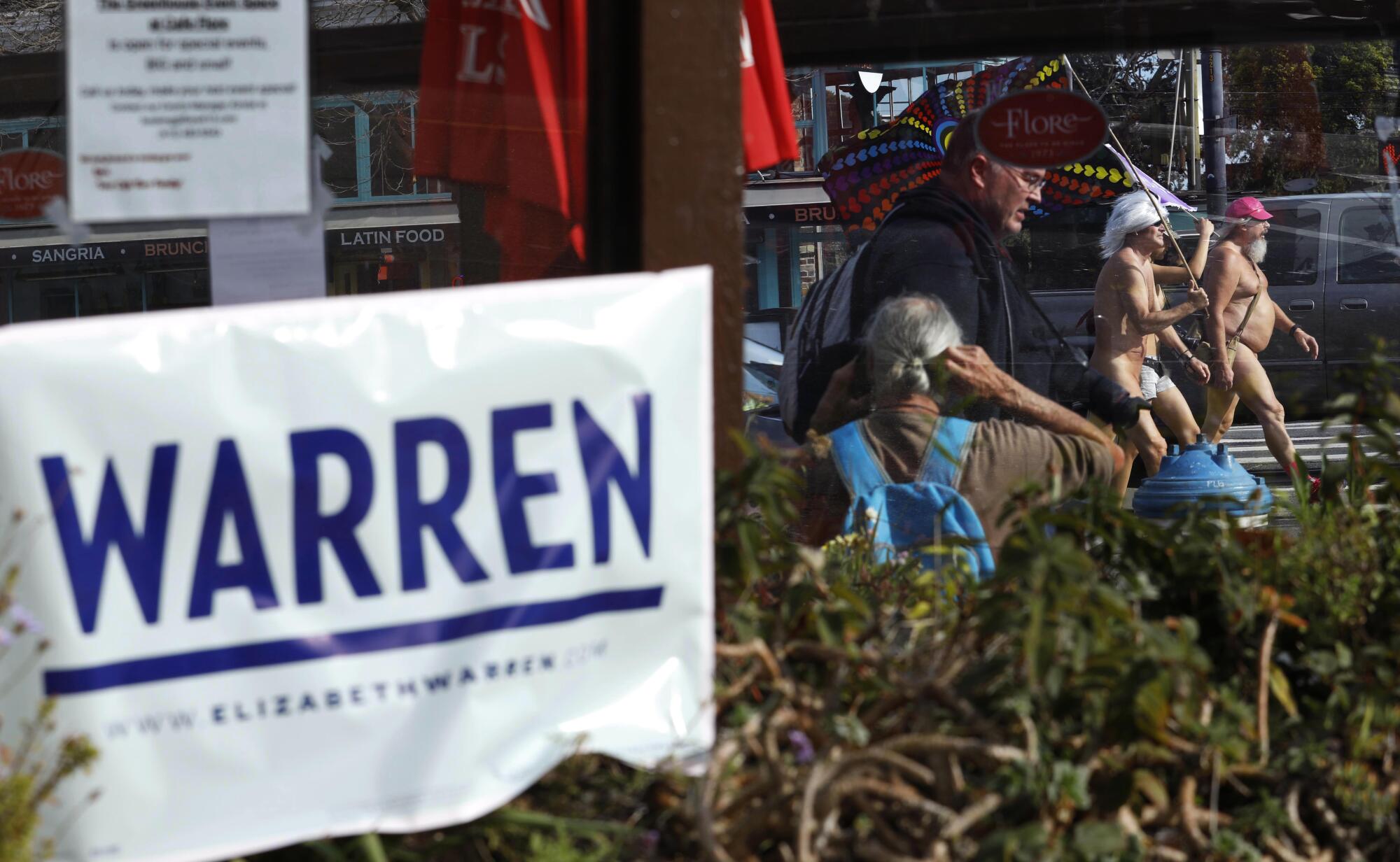
By nearly every metric, San Francisco is the bluest county in what President Trump has called “High Tax, High Crime California.” It is the GOP’s favorite punching bag, derided by the president on Twitter as a “dangerous & disgusting Slum” and home to his nemesis, “Nervous Nancy Pelosi.”
“Liberal” here means “middle of the road”; “progressive” is the leftier label.
But even in the Golden State’s left-wing heart, Democrats come in every shade of blue. Pelosi — speaker of the House of Representatives and the liberal Republicans most love to hate — has been picketed as a warmonger here and challenged from the left. Sen. Dianne Feinstein, the city’s former mayor, is viewed by many as an R in D clothing; as she ran for a fifth term in 2018, the state party did not endorse her.
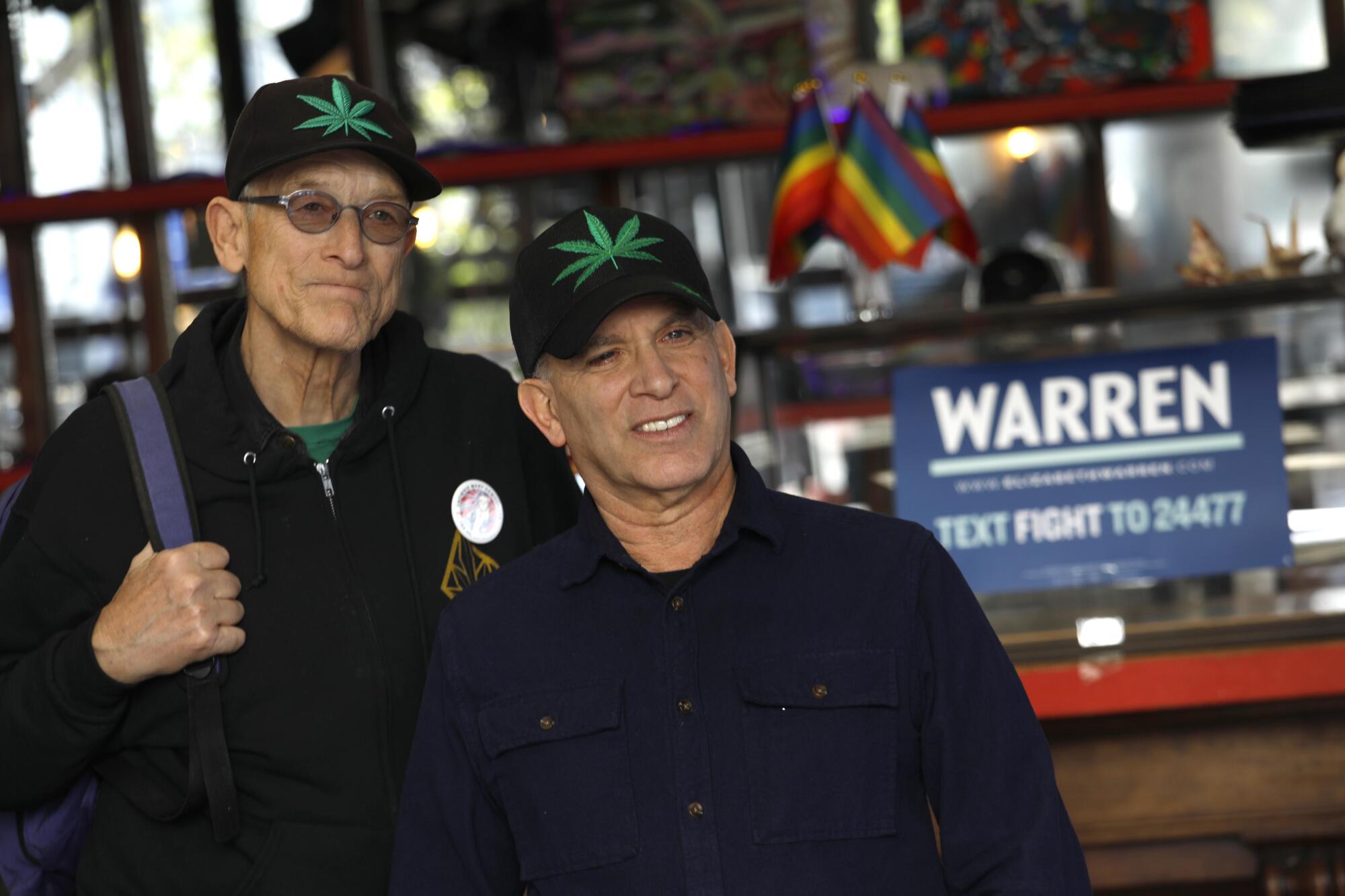
Across California and nationwide, the Democratic Party is grappling with similar political complexity during the 2020 election cycle. Unity, pundits say, is the way to roust Trump from the White House. These days, it’s in very short supply.
“The same process of factionalism within a party is being played out on the presidential stage the way it’s been played out for several decades on the small stage of San Francisco,” said Democratic political consultant Eric Jaye. “Your opponents aren’t the other party, but others within your own party.”
Sanders’ street team in San Francisco
Hillary Clinton beat Bernie Sanders both in San Francisco and statewide in the 2016 race for the Democratic nomination. This time around, the 78-year-old junior senator from Vermont benefits from a more robust California operation, and polls show him comfortably ahead of his seven rivals.
His followers, however, are leaving nothing to chance. On a recent Saturday morning, a couple of dozen Berniecrats and democratic socialists gathered in an airy acupuncture studio South of Market, intent on helping Sanders win Tuesday. There were assorted young tech workers, a case manager for homeless people, a self-described red diaper baby whose parents were Communists.
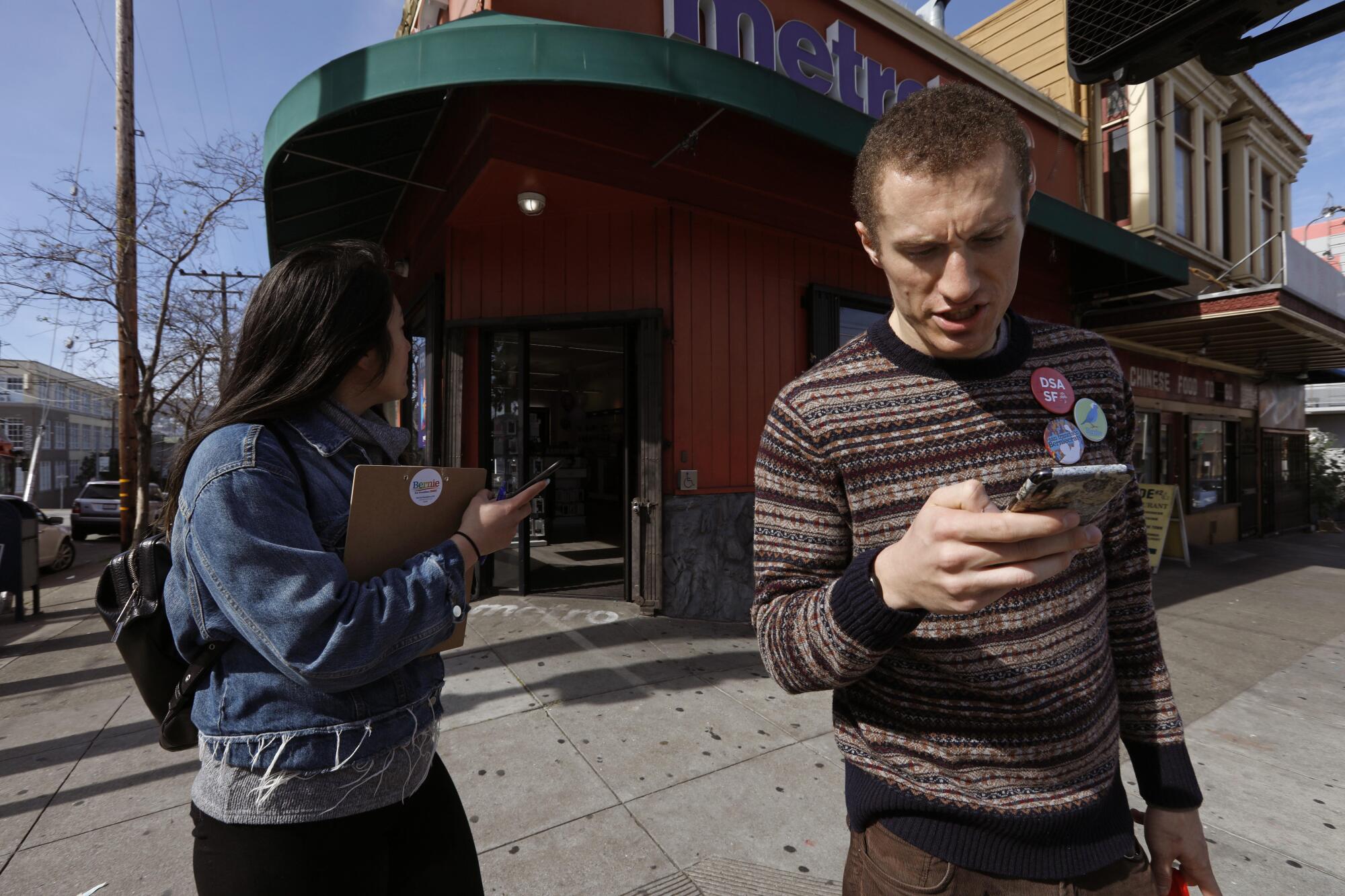
But first there was food. Toasted chickpeas, crusty artisanal bread, vegan butter. And Thin Mints. Then the “how you came to Bernie” tales, heavy on family and class struggle and the need for universal healthcare.
Dr. Hae Min Cho, event host and a doctor of Chinese medicine, told the assembled Sanders volunteers that her family came to the United States in 1971 from South Korea. They were economic refugees. They were undocumented. She was 2 years old. “We had no healthcare,” she said. “We were immigrants. We didn’t speak the language. All the things that brought me here to Bernie.”
Before they hit the street, they learned the basics of canvassing for a democratic socialist: Knock on the door. Tell your personal story. Ask whomever answers to vote. Don’t fret if your list of registered voters has outdated information. Sanders voters tend to be renters. Renters move a lot. It’s part of being in a progressive movement.
And don’t be as grumpy as the man you want to put in the White House.
“You’re an ambassador for Bernie,” Cho said. “It’s really important that no one pass judgment on others. See them as a human being. Be warm and friendly.”
‘Shades of deep blue’
San Francisco has something for everyone whose politics are left of center. There’s the Brownie Mary Democratic Club for the cannabis-minded; the Alice B. Toklas LGBT Democratic Club, which claims to be the nation’s first such Democratic organization and is not to be confused with the Harvey Milk LGBTQ Democratic Club. There are regular San Francisco Democrats and San Francisco Progressive Democrats, San Francisco Young Democrats and the San Francisco chapter of the Democratic Socialists of America, among others.
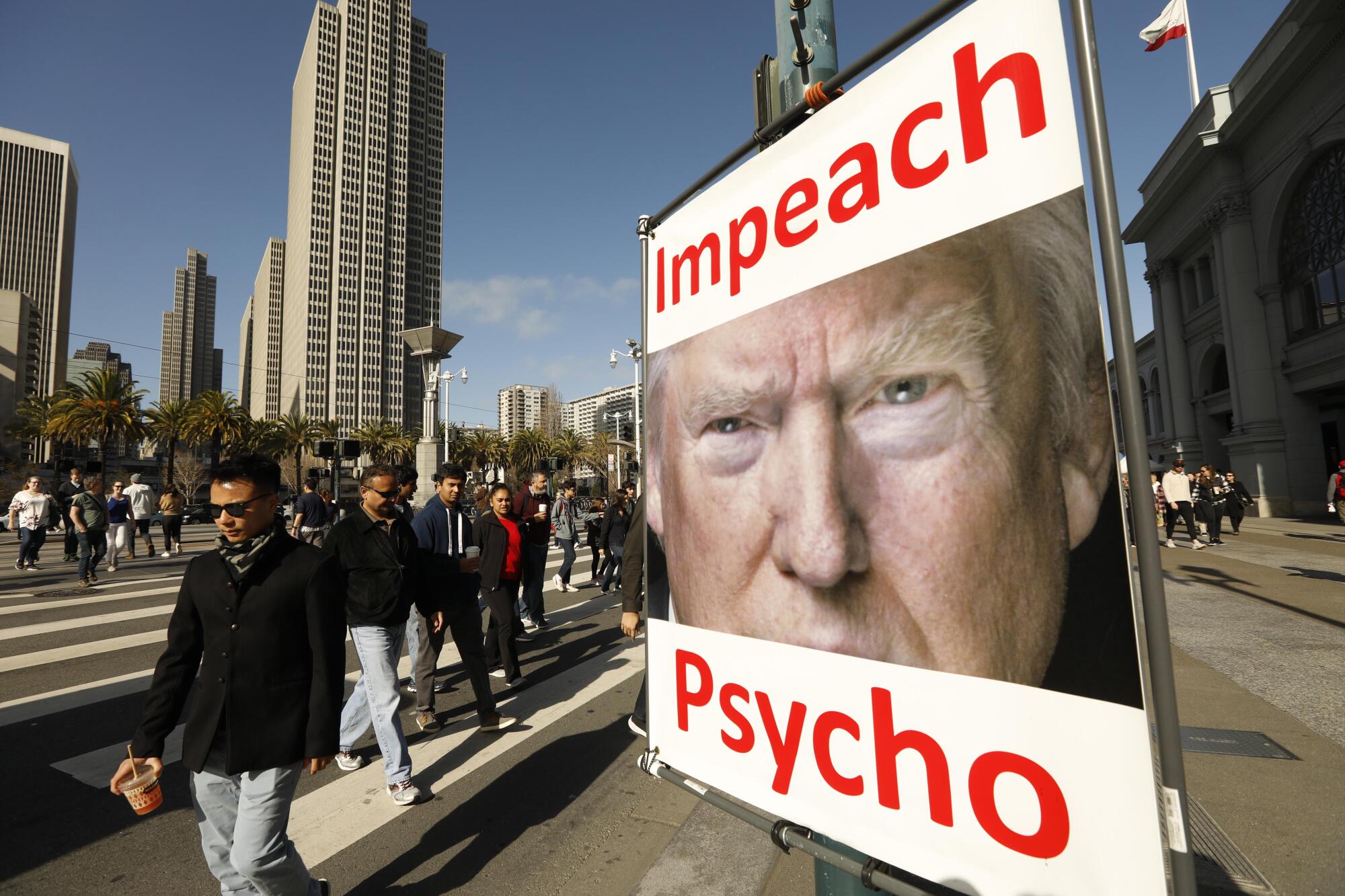
“I often describe different shades of deep blue as who we are in San Francisco,” Chiu said in an interview. “I think we’re always having debates on what ‘progressive’ means…. I think folks outside of San Francisco who observe our fights are a little mystified sometimes at where the lines are drawn.”
Anyone who believes San Francisco is simply 889,360 plastic-hating, bicycle-riding, fair-trade-coffee-sipping, Bernie-loving vegans need only talk to former Mayor Art Agnos and activist Roberta “Bertie” Brouhard.
Agnos served from 1988 to 1992 and is widely described as the city’s last progressive mayor. During his tenure, anti-growth and affordable housing advocates became part of city government. He dramatically increased San Francisco’s budget to fight the HIV/AIDS epidemic.
“I’m a pedigreed lefty,” Agnos said in a recent interview. “I was pro-neighborhood, pro-gay-rights. But I am a very pragmatic guy. I endorsed Mike Bloomberg for president…. He is the one who is best equipped politically and financially to defeat Donald Trump.
“That’s the most important issue facing our country today,” he said. “I want to win.”
Brouhard, who calls herself “a Norwegian transgender Viking princess,” is a volunteer greeter at Openhouse, which offers services and housing for LGBTQ seniors. She is a former board member of the San Francisco LGBT Center. She volunteers for Supervisor Rafael Mandelman, whose district includes the Castro and is the most progressive in San Francisco.
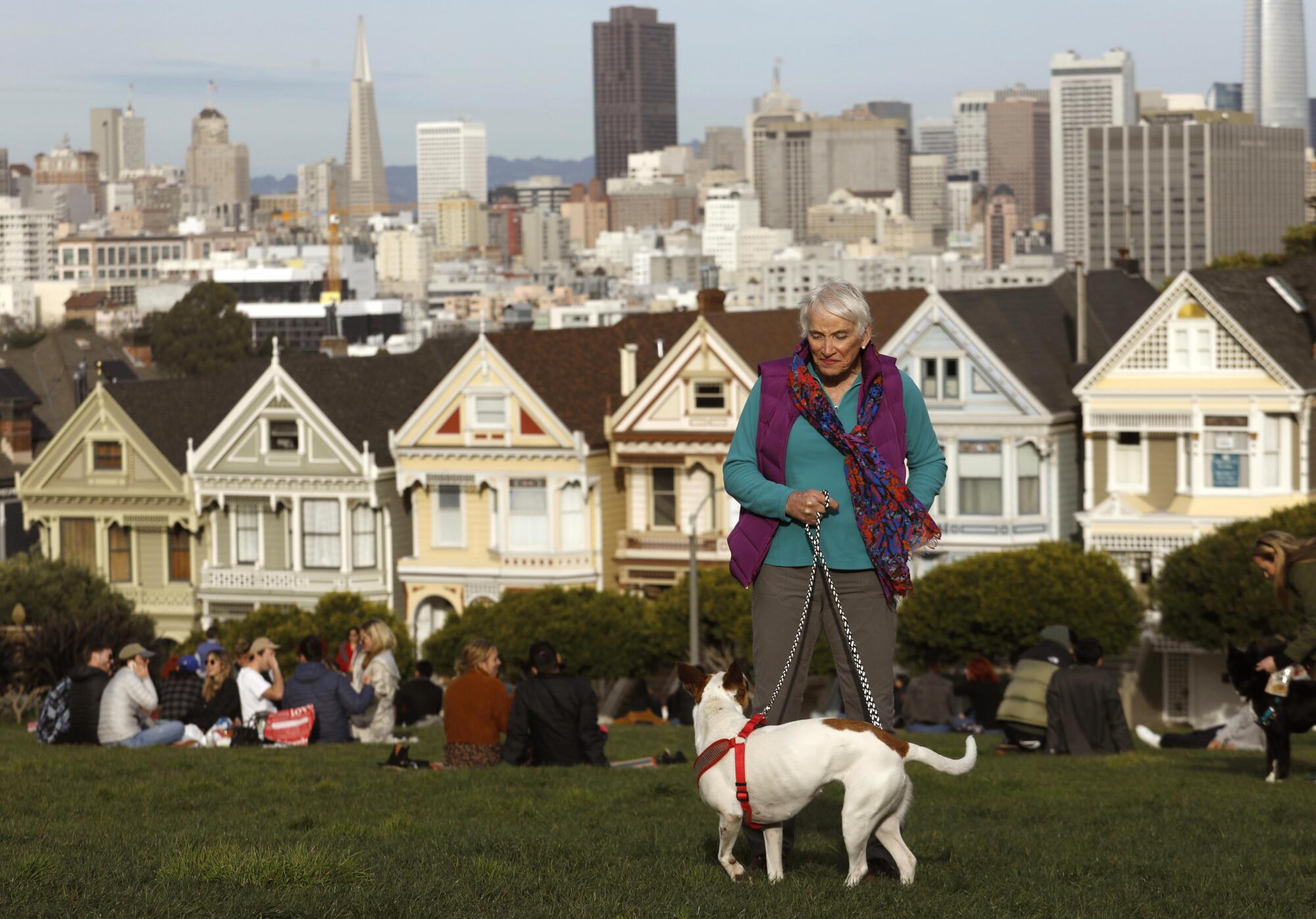
And she cast an early ballot for Bloomberg, because she believes the Democratic Party needs its own tough New Yorker to post up against the Republicans’.
Because, for all her activism, Brouhard also notes that she is a devout Lutheran. She has “very red Nebraska roots.” And she’s about to turn 74.
“Old white women like me have never been richer,” Brouhard said. “Our portfolios have never shone brighter…. If you were to consider pale blue to the royalest of blue, I’m probably closer to pale than royal. Californians have all these gradations because, my God, we’re all from somewhere else.”
Somewhere in the middle
Sunday morning of President’s Day weekend, the moderates were out in force at the Fort Mason farmers market. San Francisco Bay sparkled. The Golden Gate Bridge rose, majestic, its orange towers kissing the clear blue sky.
A smiling Pete Buttigieg watched shoppers wander by in search of in-season heirloom produce, cold-extracted unfiltered estate-grown extra virgin olive oil and bright seasonal blossoms. He didn’t say much. Life-size cardboard cutouts usually don’t.
But his supporters talked to anyone who would listen.
Mallory Brown described herself as a reformed Republican from rural Pennsylvania. She went to college at the University of Notre Dame, just outside South Bend, Ind., where Buttigieg served as mayor. When she was a student, the city’s downtown was unsafe and unappealing.
“Now that’s all changed,” said Brown, 35, who works for a private equity firm. “You can walk downtown, have lunch, have coffee, go shopping. It’s entirely because of him…. Once Pete declared, that’s who I knew I had to vote for.”
Anne Harvey, a retired civil rights lawyer, campaigned nearby for Amy Klobuchar. She sported a green-and-white “Amy for America” button on her canvas sun hat. She touted her candidate’s “common sense.” And she noted, ruefully, that she is the rare Bay Area volunteer stumping for the Minnesota senator.
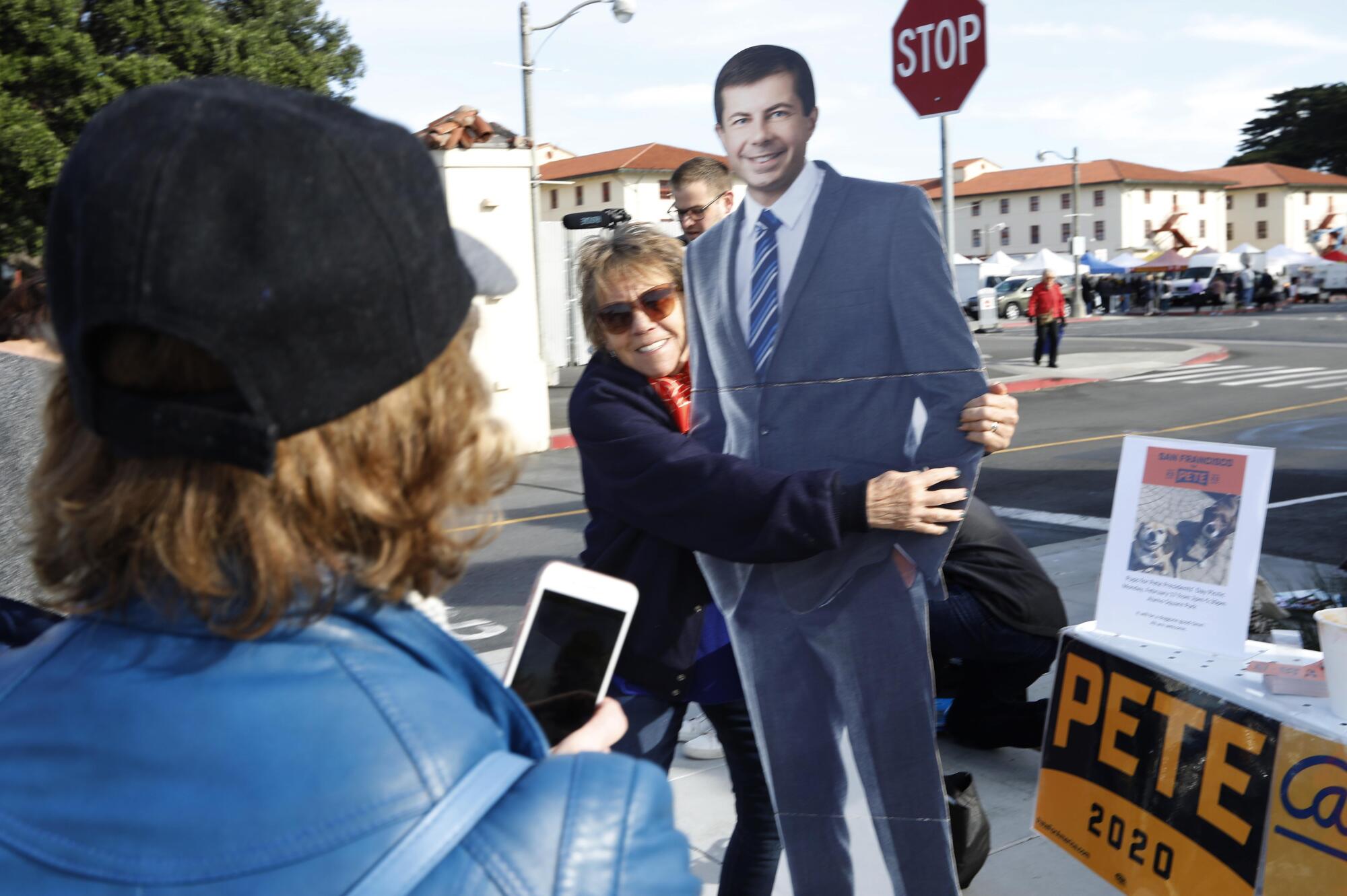
Klobuchar, said Harvey, 71, “has experience, background. If she weren’t a woman, she’d be a shoo-in.”
Sandwiched between the ironing board holding Buttigieg buttons and the card table with Klobuchar swag, retired business consultant Steve Winer talked up Bloomberg.
Nils Nilson walked by, arms weighted down with bags of organic produce, took one look at Winer’s “I Like Mike” T-shirt and laid into him about the former New York mayor’s early support for police stop-and-frisk policies.
Nilson: “It seems patently unfair to stop young black people.”
Winer: “It seems patently unfair that people can’t walk down the street safely.”
Winer, 70, predicts an ugly campaign between the president and the Democrat-to-be-named-later. He said he’s “hoping and working toward Bloomberg coming out No. 1 in San Francisco,” but he’d campaign and vote for whichever Democrat won if it came to that.
Because “I can’t go to my grave,” he said, “knowing I didn’t do everything I could to beat Trump.”
That’s one thing San Francisco Democrats of all stripes can agree on.
More to Read
Sign up for Essential California
The most important California stories and recommendations in your inbox every morning.
You may occasionally receive promotional content from the Los Angeles Times.
